八上Unit 1 Where did you go on vacation? 单元知识点复习课件(共28张PPT)
文档属性
| 名称 | 八上Unit 1 Where did you go on vacation? 单元知识点复习课件(共28张PPT) | 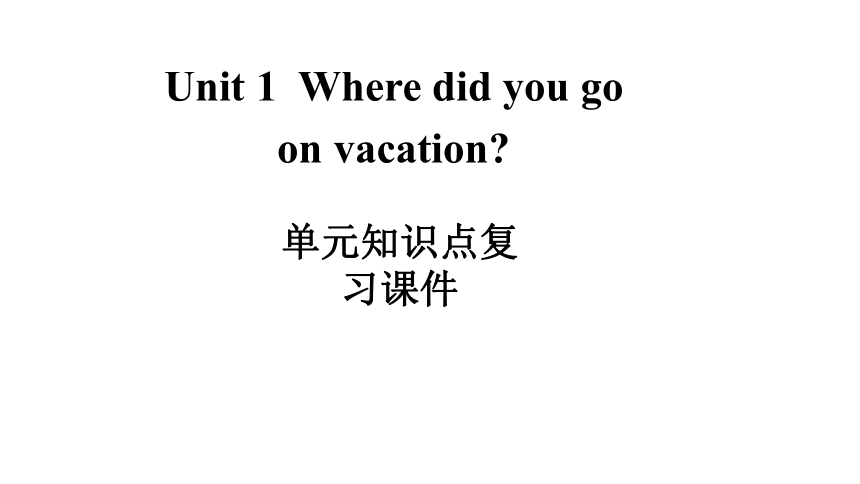 | |
| 格式 | pptx | ||
| 文件大小 | 164.2KB | ||
| 资源类型 | 教案 | ||
| 版本资源 | 人教新目标(Go for it)版 | ||
| 科目 | 英语 | ||
| 更新时间 | 2023-10-26 15:06:54 | ||
图片预览

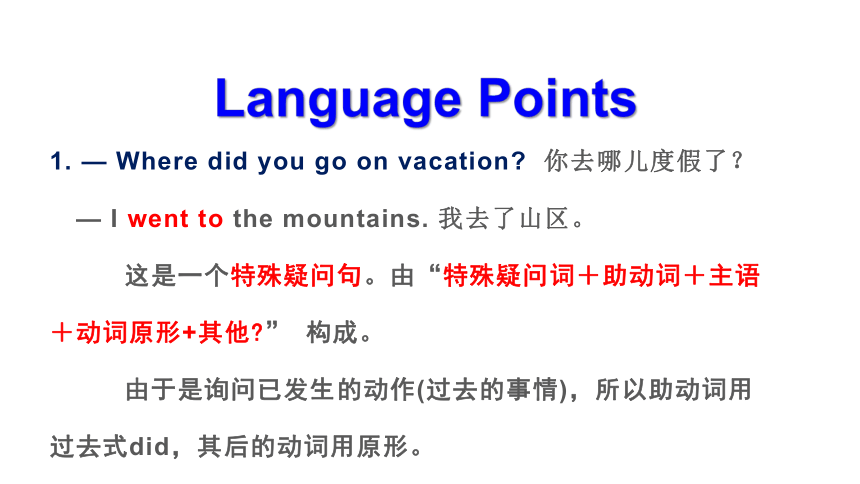
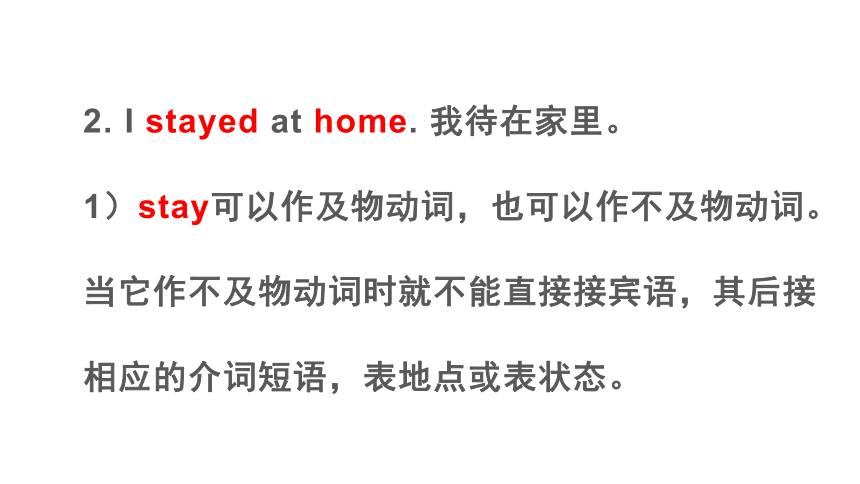
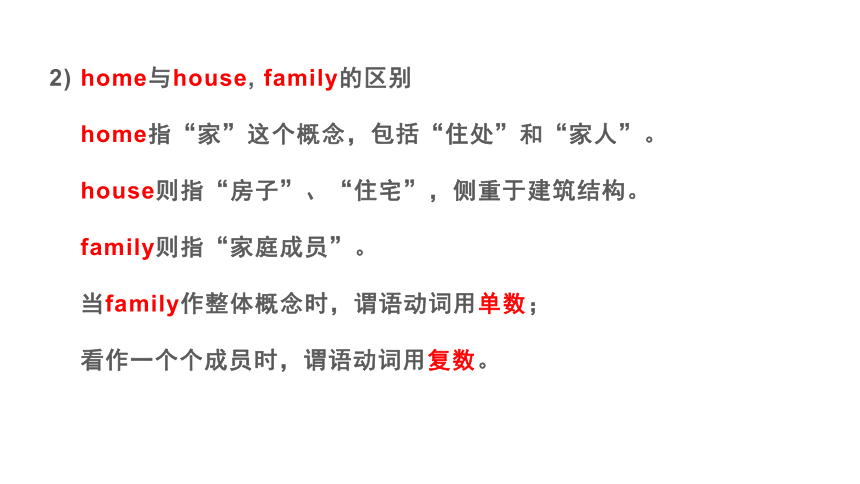
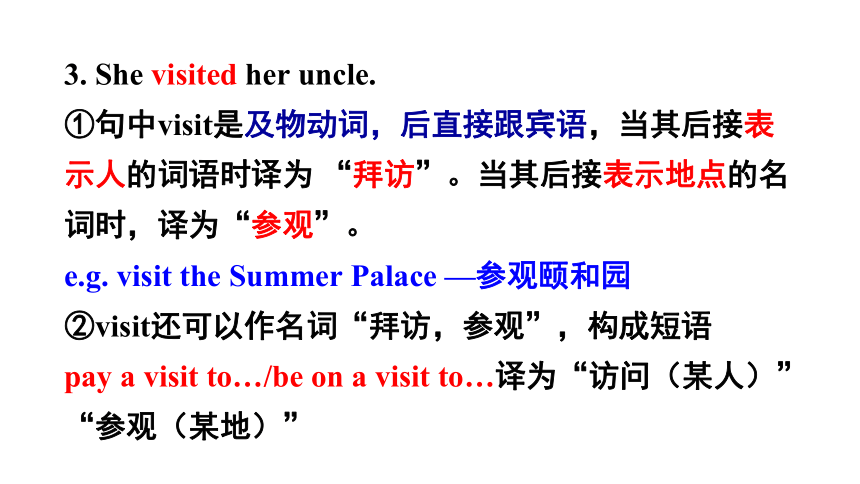
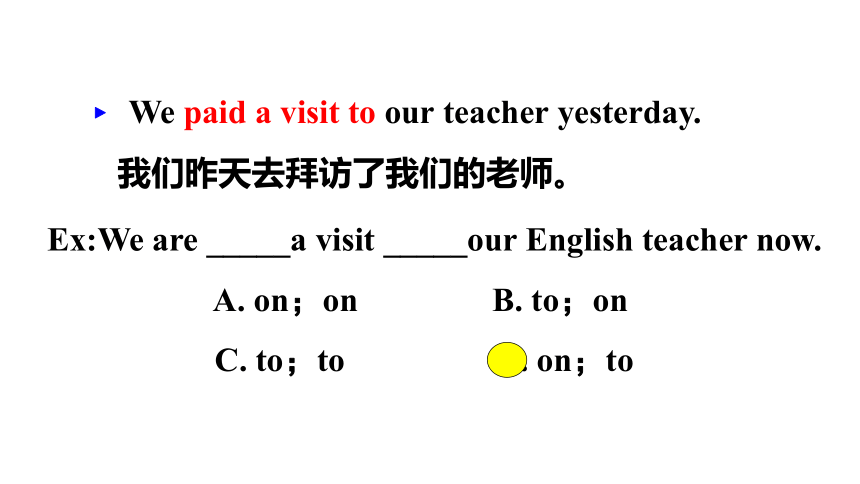
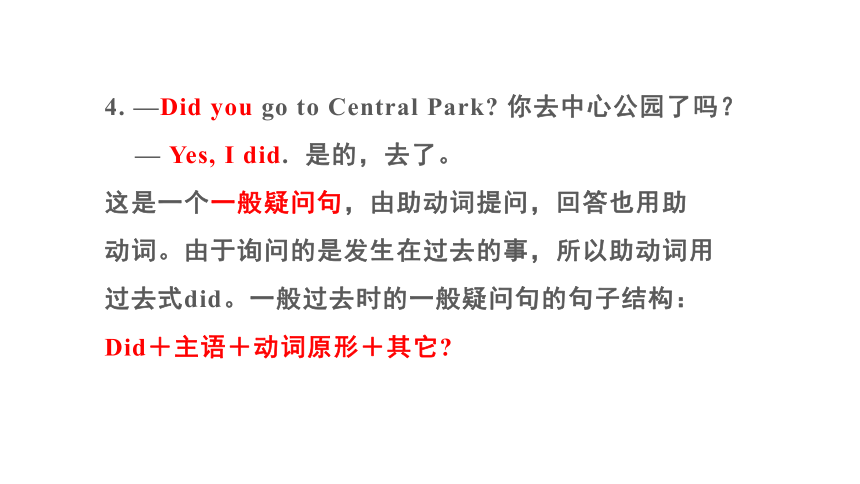
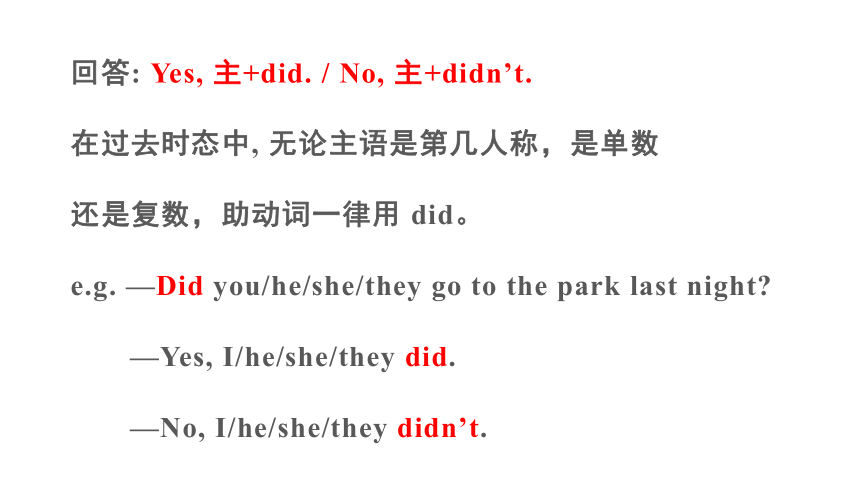
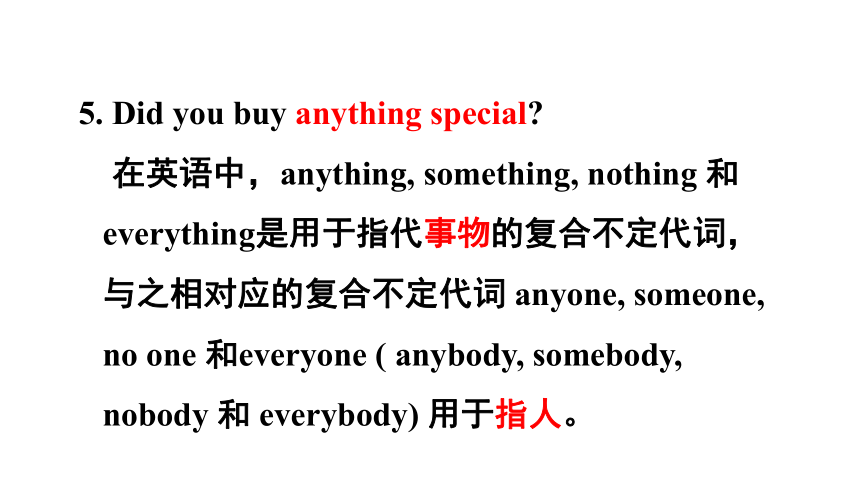
文档简介
(共28张PPT)
Unit 1 Where did you go on vacation
单元知识点复习课件
1. — Where did you go on vacation 你去哪儿度假了?
— I went to the mountains. 我去了山区。
这是一个特殊疑问句。由“特殊疑问词+助动词+主语
+动词原形+其他 ” 构成。
由于是询问已发生的动作(过去的事情),所以助动词用
过去式did,其后的动词用原形。
Language Points
2. I stayed at home. 我待在家里。
1)stay可以作及物动词,也可以作不及物动词。
当它作不及物动词时就不能直接接宾语,其后接
相应的介词短语,表地点或表状态。
2) home与house, family的区别
home指“家”这个概念,包括“住处”和“家人”。
house则指“房子”、“住宅”,侧重于建筑结构。
family则指“家庭成员”。
当family作整体概念时,谓语动词用单数;
看作一个个成员时,谓语动词用复数。
3. She visited her uncle.
①句中visit是及物动词,后直接跟宾语,当其后接表示人的词语时译为 “拜访”。当其后接表示地点的名词时,译为“参观”。
e.g. visit the Summer Palace —参观颐和园
②visit还可以作名词“拜访,参观”,构成短语
pay a visit to…/be on a visit to…译为“访问(某人)”
“参观(某地)”
We paid a visit to our teacher yesterday.
我们昨天去拜访了我们的老师。
Ex:We are _____a visit _____our English teacher now.
A. on;on B. to;on
C. to;to D. on;to
4. —Did you go to Central Park 你去中心公园了吗?
— Yes, I did. 是的,去了。
这是一个一般疑问句,由助动词提问,回答也用助
动词。由于询问的是发生在过去的事,所以助动词用
过去式did。一般过去时的一般疑问句的句子结构:
Did+主语+动词原形+其它
回答: Yes, 主+did. / No, 主+didn’t.
在过去时态中, 无论主语是第几人称,是单数
还是复数,助动词一律用 did。
e.g. —Did you/he/she/they go to the park last night
—Yes, I/he/she/they did.
—No, I/he/she/they didn’t.
5. Did you buy anything special
在英语中,anything, something, nothing 和everything是用于指代事物的复合不定代词,与之相对应的复合不定代词 anyone, someone, no one 和everyone ( anybody, somebody, nobody 和 everybody) 用于指人。
与形容词连用时, 形容词必须放在复合不定代词之后,语法上称作“后置”。
e.g. something important—— 重要的事
I can see someone new in your group.
我看出你们小组里有新人。
There’s nothing interesting in the news today.
今天的新闻里没有什么有趣的事。
6. I was on vacation last month.
be on vacation 译为 “在度假”,强调状态。
而 go to vacation, “去度假”,强调动作。
我们应该如何区分英语中强调动作和状态的词语:
1)一般来说,单独的动词/短语一般强调动作;而“be + 分词/形容词”则只表状态。如marry sb.和get married to sb.表动作,而be married to sb.表状态。
2)如果动词是延续性动词,则一般它既可表示
动作, 也可以表示状态。
e.g. live/stay/work…
3)如果是单独的瞬间性动词,则它只表示动作。
e.g. get up/put on/begin…
7. We took quite a few photos there.
此句中 quite a few 是一个整体结构,表示“相当多”, 修饰可数名词,不能与a few(少数几个) 混淆。
比较下面例句中quite a few 和a few的区别:
e.g. There are only a few books on the table, but I still have quite a few in the bookcase.
虽然桌上只有几本书,但我的书柜里还有很多书。
quite a few 相当多的;不少的 相当于many,修饰
可数名词复数。
quite a little 许多的, 相当多的 相当于much,修饰
不可数名词。
quite a few与quite a little
8. Did you buy anything special
复合不定代词分为:
指物:anything, something, nothing, everything
指人:anyone, someone, no one, everyone/ anybody, somebody, nobody, everybody
“后置”:复合不定代词 + adj.
e.g. I can see someone new in your group.
复合不定代词
adj.
+
9. What a difference a day makes!
一天的差异是多么大啊!
e.g. What a lovely day! 多么好的一天啊!
What nice people they are!
他们是多么好的人呀!
这是一个感叹句。强调名词时,句首用what。
10. …so we decided to take the train.我们决定乘火车。
1) decide to do sth. 决定做某事
e.g. They decided to go to Hainan on vacation.
I decided to go to Shandong for summer holiday.
2) decide not to do sth. 决定不做某事
e.g. I decided not to go there for a holiday
again. 我决定再也不去那里度假了。
11. And because of the bad weather, we couldn’t see anything below.
因为这糟糕的天气,我们看不到下面任何东西。
(1) 此句中 because of 为副词,后接短语,它引导原因状语从句,而我们学过的“because”是连词,其后接句子。
because of 介词短语,“因为”,后接名词、代词、动名词或what从句等。
because 连词,“因为”,引导原因状语从句,表示直接、明确的原因或理由。
【辨析】because与because of
We couldn’t go out _____________ the bad weather.
因为坏天气,我们不能出去。
He can’t play with his brother ________ he has class.
因为有课,他不能和哥哥一起玩。
because of
because
(2) below /b 'l / prep.& adv. 在……下面;到……下面
Below the mountain, thousands of visitors are walking up here.(作介词)
山下数以千计的游客在往上爬。
Please look at the news below.(作副词)
请看看下面的新闻。
【注意】below指的是物体在某物下方,但不一定是正下方,所指范围较宽。反义词是above。
【辨析】below/above; on/beneath, over/under
12.We waited over an hour for the train because there were too many people. 我们等了一个多小时火车因为人太多了。
too many +pl. “太多的……”
区分:too much+U. “太多的……”
much too+adj./ adv.“太……” (加深程度)
ex.There are _________ people in the street.
He eats _________, so he becomes ___________fat.
Don't eat __________sugar.It's bad for your health.
too many
too much
much too
too much
13.My father didn’t bring enough money ...
我爸爸没带足够的钱……
enough adj. adv. “充足的(地),足够的(地)”
用法规则:名前形副后
eg. The boy is old enough to go to school.
这个男孩足够大能去上学了。
We still have enough time to make this birthday cake
look beautiful enough.
我们仍有足够的时间使这个蛋糕看起来足够漂亮。
1. The weather was _______ (晴朗) last week.
2. The good news made us _______ (感到) very happy.
3. I found a girl ________ (哭) in the corner on my way
home yesterday.
4. We had __________ (美味的) Sichuan food for dinner
today.
5. Where did you go on your _________ (假期)
sunny
feel
crying
delicious
vacation
Ⅰ. 填空。
Exercises
6. Her sweater was ______________. (昂贵的)
7. She _______ (学习) for exams last week.
8. Cathy _________(听) to popular music last night.
9. Jim ______ (去) to the movies with his friends last
weekend.
10. She ______ (看) an interesting talk show yesterday.
expensive
studied
listened
went
saw
Ⅱ. 补全对话。
A: Hi, Lucy. How _____ you
B: I _____ fine, thank you. How ____ your vacation
A: It _____ interesting.
B: Really Where ______ you go on vacation
A: I _____ to the mountains.
B: _____ you see the monkey
A: Yes, I did.
are
am
was
was
did
went
Did
1. I _______ _____(not visit) the Great Wall last summer.
I _______ (go) to Qingdao on vacation.
2. — How _____ (be) the beaches there
— Beautiful.
didn’t visit
went
were
Ⅲ. 用括号内所给单词的适当形式填空。
3. — ____ Nancy ____ (go) to New York city last weekend
— Yes. She_____ (go) there with her parents.
4. Mary ________ (stay) at home and _______ (study) for
the exam last Sunday.
5. — What ______you ______(buy) in Beijing
— I bought nothing.
Did
go
went
stayed
studied
did
buy
Unit 1 Where did you go on vacation
单元知识点复习课件
1. — Where did you go on vacation 你去哪儿度假了?
— I went to the mountains. 我去了山区。
这是一个特殊疑问句。由“特殊疑问词+助动词+主语
+动词原形+其他 ” 构成。
由于是询问已发生的动作(过去的事情),所以助动词用
过去式did,其后的动词用原形。
Language Points
2. I stayed at home. 我待在家里。
1)stay可以作及物动词,也可以作不及物动词。
当它作不及物动词时就不能直接接宾语,其后接
相应的介词短语,表地点或表状态。
2) home与house, family的区别
home指“家”这个概念,包括“住处”和“家人”。
house则指“房子”、“住宅”,侧重于建筑结构。
family则指“家庭成员”。
当family作整体概念时,谓语动词用单数;
看作一个个成员时,谓语动词用复数。
3. She visited her uncle.
①句中visit是及物动词,后直接跟宾语,当其后接表示人的词语时译为 “拜访”。当其后接表示地点的名词时,译为“参观”。
e.g. visit the Summer Palace —参观颐和园
②visit还可以作名词“拜访,参观”,构成短语
pay a visit to…/be on a visit to…译为“访问(某人)”
“参观(某地)”
We paid a visit to our teacher yesterday.
我们昨天去拜访了我们的老师。
Ex:We are _____a visit _____our English teacher now.
A. on;on B. to;on
C. to;to D. on;to
4. —Did you go to Central Park 你去中心公园了吗?
— Yes, I did. 是的,去了。
这是一个一般疑问句,由助动词提问,回答也用助
动词。由于询问的是发生在过去的事,所以助动词用
过去式did。一般过去时的一般疑问句的句子结构:
Did+主语+动词原形+其它
回答: Yes, 主+did. / No, 主+didn’t.
在过去时态中, 无论主语是第几人称,是单数
还是复数,助动词一律用 did。
e.g. —Did you/he/she/they go to the park last night
—Yes, I/he/she/they did.
—No, I/he/she/they didn’t.
5. Did you buy anything special
在英语中,anything, something, nothing 和everything是用于指代事物的复合不定代词,与之相对应的复合不定代词 anyone, someone, no one 和everyone ( anybody, somebody, nobody 和 everybody) 用于指人。
与形容词连用时, 形容词必须放在复合不定代词之后,语法上称作“后置”。
e.g. something important—— 重要的事
I can see someone new in your group.
我看出你们小组里有新人。
There’s nothing interesting in the news today.
今天的新闻里没有什么有趣的事。
6. I was on vacation last month.
be on vacation 译为 “在度假”,强调状态。
而 go to vacation, “去度假”,强调动作。
我们应该如何区分英语中强调动作和状态的词语:
1)一般来说,单独的动词/短语一般强调动作;而“be + 分词/形容词”则只表状态。如marry sb.和get married to sb.表动作,而be married to sb.表状态。
2)如果动词是延续性动词,则一般它既可表示
动作, 也可以表示状态。
e.g. live/stay/work…
3)如果是单独的瞬间性动词,则它只表示动作。
e.g. get up/put on/begin…
7. We took quite a few photos there.
此句中 quite a few 是一个整体结构,表示“相当多”, 修饰可数名词,不能与a few(少数几个) 混淆。
比较下面例句中quite a few 和a few的区别:
e.g. There are only a few books on the table, but I still have quite a few in the bookcase.
虽然桌上只有几本书,但我的书柜里还有很多书。
quite a few 相当多的;不少的 相当于many,修饰
可数名词复数。
quite a little 许多的, 相当多的 相当于much,修饰
不可数名词。
quite a few与quite a little
8. Did you buy anything special
复合不定代词分为:
指物:anything, something, nothing, everything
指人:anyone, someone, no one, everyone/ anybody, somebody, nobody, everybody
“后置”:复合不定代词 + adj.
e.g. I can see someone new in your group.
复合不定代词
adj.
+
9. What a difference a day makes!
一天的差异是多么大啊!
e.g. What a lovely day! 多么好的一天啊!
What nice people they are!
他们是多么好的人呀!
这是一个感叹句。强调名词时,句首用what。
10. …so we decided to take the train.我们决定乘火车。
1) decide to do sth. 决定做某事
e.g. They decided to go to Hainan on vacation.
I decided to go to Shandong for summer holiday.
2) decide not to do sth. 决定不做某事
e.g. I decided not to go there for a holiday
again. 我决定再也不去那里度假了。
11. And because of the bad weather, we couldn’t see anything below.
因为这糟糕的天气,我们看不到下面任何东西。
(1) 此句中 because of 为副词,后接短语,它引导原因状语从句,而我们学过的“because”是连词,其后接句子。
because of 介词短语,“因为”,后接名词、代词、动名词或what从句等。
because 连词,“因为”,引导原因状语从句,表示直接、明确的原因或理由。
【辨析】because与because of
We couldn’t go out _____________ the bad weather.
因为坏天气,我们不能出去。
He can’t play with his brother ________ he has class.
因为有课,他不能和哥哥一起玩。
because of
because
(2) below /b 'l / prep.& adv. 在……下面;到……下面
Below the mountain, thousands of visitors are walking up here.(作介词)
山下数以千计的游客在往上爬。
Please look at the news below.(作副词)
请看看下面的新闻。
【注意】below指的是物体在某物下方,但不一定是正下方,所指范围较宽。反义词是above。
【辨析】below/above; on/beneath, over/under
12.We waited over an hour for the train because there were too many people. 我们等了一个多小时火车因为人太多了。
too many +pl. “太多的……”
区分:too much+U. “太多的……”
much too+adj./ adv.“太……” (加深程度)
ex.There are _________ people in the street.
He eats _________, so he becomes ___________fat.
Don't eat __________sugar.It's bad for your health.
too many
too much
much too
too much
13.My father didn’t bring enough money ...
我爸爸没带足够的钱……
enough adj. adv. “充足的(地),足够的(地)”
用法规则:名前形副后
eg. The boy is old enough to go to school.
这个男孩足够大能去上学了。
We still have enough time to make this birthday cake
look beautiful enough.
我们仍有足够的时间使这个蛋糕看起来足够漂亮。
1. The weather was _______ (晴朗) last week.
2. The good news made us _______ (感到) very happy.
3. I found a girl ________ (哭) in the corner on my way
home yesterday.
4. We had __________ (美味的) Sichuan food for dinner
today.
5. Where did you go on your _________ (假期)
sunny
feel
crying
delicious
vacation
Ⅰ. 填空。
Exercises
6. Her sweater was ______________. (昂贵的)
7. She _______ (学习) for exams last week.
8. Cathy _________(听) to popular music last night.
9. Jim ______ (去) to the movies with his friends last
weekend.
10. She ______ (看) an interesting talk show yesterday.
expensive
studied
listened
went
saw
Ⅱ. 补全对话。
A: Hi, Lucy. How _____ you
B: I _____ fine, thank you. How ____ your vacation
A: It _____ interesting.
B: Really Where ______ you go on vacation
A: I _____ to the mountains.
B: _____ you see the monkey
A: Yes, I did.
are
am
was
was
did
went
Did
1. I _______ _____(not visit) the Great Wall last summer.
I _______ (go) to Qingdao on vacation.
2. — How _____ (be) the beaches there
— Beautiful.
didn’t visit
went
were
Ⅲ. 用括号内所给单词的适当形式填空。
3. — ____ Nancy ____ (go) to New York city last weekend
— Yes. She_____ (go) there with her parents.
4. Mary ________ (stay) at home and _______ (study) for
the exam last Sunday.
5. — What ______you ______(buy) in Beijing
— I bought nothing.
Did
go
went
stayed
studied
did
buy
同课章节目录
- Unit 1 Where did you go on vacation?
- Section A
- Section B
- Unit 2 How often do you exercise?
- Section A
- Section B
- Unit 3 I'm more outgoing than my sister.
- Section A
- Section B
- Unit 4 What's the best movie theater?
- Section A
- Section B
- Unit 5 Do you want to watch a game show?
- Section A
- Section B
- Unit 6 I'm going to study computer science.
- Section A
- Section B
- Unit 7 Will people have robots?
- Section A
- Section B
- Unit 8 How do you make a banana milk shake?
- Section A
- Section B
- Unit 9 Can you come to my party?
- Section A
- Section B
- Unit 10 If you go to the party, you'll have a grea
- Section A
- Section B
